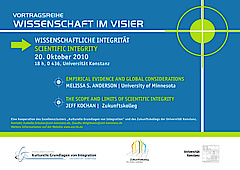Wissenschaftliche Integrität
20. Oktober 2010
Empirical Evidence and Global Considerations
Prof. Melissa Susan Anderson (Minnesota)
The integrity of the scientific record is a fundamental concern of all researchers and research institutions. Empirical evidence based on a national study in the U.S. suggests, however, that certain features of the research environment are associated with counter-normative perspectives on science as well as behaviors that compromise the integrity of research. Responses to such challenges often take the form of reactions to individual cases of misconduct, but a more proactive and instructive approach is needed. International research collaborations indicate additional concerns related to scientific integrity that must be addressed on a global scale.
The Scope and Limits of Scientific Integrity
Dr. Jeff Kochan (Konstanz/Zukunftskolleg)
An emphasis on integrity relations in science brings with it specific commitments about what science is, and what it should be. Indeed too strong a focus on scientific integrity may distract us from another important, perhaps essential, element in scientific organization: what I shall call intimacy relations. It seems very difficult to determine how we might balance integrity and intimacy relations in a way which serves both scientific progress and the public interest. I illustrate this problem with an example: the debate over who was responsible for the 1986 explosion of the space shuttle Challenger.
Über die Reihe
Die Vortragsreihe wagt den Blick hinter das Selbstverständnis von Wissenschaft, ihre Methoden und ihre Geschichte: Wie ethisch gehen Wissenschaftler angesichts der Konkurrenz um Publikationserfolge vor? Kann man aus wissenschaftlichem Erfolg schließen, dass die Wahrheit über die Welt erfasst wird? Wie wirkten sich wissenschaftliche Irrtümer auf die Geschichte der Wissenschaft aus?
20. Oktober 2010, 18-20 Uhr
Universität Konstanz, D 436
Im Rahmen der Veranstaltungsreihe Wissenschaft im Visier, veranstaltet vom Exzellenzcluster „Kulturelle Grundlagen von Integration“ und dem Zukunftskolleg der Universität Konstanz
